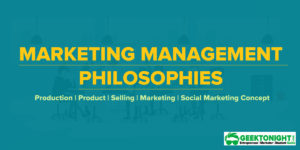What is Industrial Marketing?
Industrial marketing or business marketing is to market the products and services to business organizations. Their buyers can be manufacturing companies, government undertakings, private sector organizations, educational institutions, hospitals, distributors, and dealers. The business organizations, buy products and services to meet their aims like maximizing profits, minimizing costs, use of latest technology, and so on.
On the other hand, consumer marketing involves the marketing of products and services to individuals, families, and households. The consumers buy products and services for their own consumption.
Table of Content
Industrial marketing consists of all process involved in the marketing of products and services to organizations that use products and services in the production of consumer or industrial goods and services. The organizations selling goods like steel, machine tools, computers, courier services, and other goods and services to buying organizations.
They also need to recognize and define the buyers needs, purchasing power, trade policies, and buying procedures. The selling organizations should also focus on offering value-added product and services.
For example, a company manufacturing and marketing tyre tubes to motorbike company, a manufacturer is doing industrial marketing. Industrial marketer of the tyre tubes company must understand the needs of motorbike manufacturers such as Hero Motocorp and Honda, Bajaj, Yamaha in terms of their quality standards, applications of tubes, availability or delivery on daily or weekly basis, and so on.
Definition of Industrial Marketing
Industrial marketing is the marketing of goods and services by one business to another. The term, industrial marketing has largely been replaced by the term B2B marketing.
The word Industrial Marketing is also used for Business-to- Business Marketing, or Business Marketing, or Organizational Marketing.
Concept of Industrial Marketing
The marketing concept is useful and important for both the industrial and consumer markets due to the differences in terms of the nature of markets. The marketing theory for the business organization of industrial buyer is to identify and define the needs of a target market and change the organizations product or service to satisfy those needs.
It is proved that consumer marketers have embrace the marketing concept more holistically than their industrial complement because Industrial customers like organization businesses, institutions, and government agencies have unique needs. The industrial marketing concept consists more than facilitating exchange with these customers. This is because it is based upon the relation between buyer and seller.
Good relationship between buyer and seller is must for achieving the organizational goals of both. Many of the technically oriented companies focus on the technical part of their products besides in its place of concentrating on the added value for their customers.
An industrial marketer can create added value by providing training of technical knowledge in an efficient and effective way. This effective marketing not only helps to increase sales – it leads to the creation of a more valuable asset, recognized brand something firms might want to sell someday.
Normally industrial marketing involves large orders and long-term relationships between the producer and supplier, the process of transaction is too difficult or more complex than the transaction between business to an individual customer. The B2C sales has focuses on interactions between two parties.
While B2C sales might focus on one-on-one interactions between two parties, while business-to-business (B2B) refers to a situation where one business makes a transaction with other business.
This typically occurs when:
- A business is sourcing materials for their production process (e.g. a car manufacturer purchasing tyre)
- A business needs the services of another for operational reasons (e.g. a car manufacturer employing an accountancy firm to audit their finances)
- A business re-sells goods and services produced by others (e.g. a dealer buying the end product from the car manufacturer)
Types of Industrial Product
Industrial products are defined as the products, which are used for processing or for carrying out a business. Thus, the peculiarity between a consumer product and an industrial product is depending on the purpose for which the product is bought.
For example, we can say a customer buys a mixer or juicer or grinder for domestic use it is a consumer product, whereas when the same mixer/juicer/grinder is sold to a fruit juice vendor it is termed as an industrial product. Industrial marketing can also be carried out in Business Services.
Industrial Products can be classified in three broad categories:
- Materials & Parts
- Capital Items and
- Supplies and Services
Material & Parts
These consists raw material, finished material & parts. Raw materials are generally farm products namely cotton, wheat, vegetables etc. Some natural products like namely meat, petroleum product, iron etc. whereas finished material and parts are items like iron rods, linen yarns, wires and cables etc. and component and parts can be household appliance motors, components of PC’s, component parts of motor vehicles etc.
Capital Items
The industrial products which assist the buyer’s production and operations are termed as capital items. These include accessory equipments, installations or may be buildings, complex computer systems. Some other items which can be added to this are the accessory equipment which can aid the production Process.
For example, forklift trucks for material handling, equipments & furniture etc. These products like forklift trucks for material handling, equipments & furniture etc., have a shorter life span than buildings, complex computer systems as mentioned at the beginning.
Supplies & Services
This is also another type of industrial products and services in industrial marketing. This includes the items that have a constant use in the plant or in office. Cleaning equipments, paints, pencils, printer inks, photocopy papers, etc. are the convenience products and are purchased with no difficulty.
Maintenance and repair services are the items like window and furniture cleaning material computer repair etc. There are also the business consultative services like legal, management consulting, promotional etc. The needs and objectives of industrial buyers are satisfied through the following exchange processes. There can be four different types of exchanges in industrial marketing
Types of Exchange process
The nature of any business organization of industrial buyer is to identify and define the needs and objectives of a target market. It is profound that industrial marketing is totally different than consumer marketing because Industrial customers like organization businesses, institutions, and government agencies having unique needs.
Thus industrial marketing concept consist of different exchange processes with these customers. The needs and objectives of industrial buyers are satisfied through the following exchange processes.
Product Exchange Process
The characteristics of the Product exchange process is any product or service involved have a significant impact on the industrial exchange process. The comfort of exchange is based upon the ability of the seller to identify the buyer’s needs and the product’s potential to meet those needs.
For example supply of soap or detergent powder to the manufacturers of soaps or detergents. To HUL there are suppliers of the raw materials of soap, detergent raw materials to give the end product s like Rin Detergent Bar or Surf Excel.
Information Exchange Process
When one organization gives the technical knowledge, economic consultancy, or giving replies to organizational questions to another organization it is termed as information exchange.
It consists of technical, economic, and organizational questions pre and post-sale maintenance and servicing information that must be exchanged to the participants of business organizations.
For example we can cite the installation of sophisticated software’s in an organization and operating system of that software can be termed as information exchange.
Financial Exchange Process
The yielding of credit or the need to exchange money from one currency to another at the time of dealing with foreign buyers is called as foreign exchange. Award of credit facilities to an organization is financial exchange. Exchange of currencies between two organizations in two different countries is financial exchange process.
For example we can say the functioning of Industrial Development Bank of India (IDBI), which grants loans to industries.
Societal Exchange Process
Social exchange is significant in areas of reducing ambiguity between buyer and seller. Avoiding short-term difficulties and thus maintaining a better relation over a long period of time. There are a number of factors in an agreement between buyers and sellers in the industrial market. They are based on arbitration and mutual trust, not completely official or based on legal criteria.
Types of Industrial Customers
Industrial customers are normally classified into four groups:
- Commercial Enterprises
- Governmental Agencies
- Institutions
- Co-operative Societies
These are as shown as follows:
Commercial Enterprises
Commercial enterprises are private sector, profit-seeking organisations such as IBM, General Motors, Computer Land, and Raven Company, purchase industrial goods and/or services for purposes other than selling directly to ultimate consumers.
However, since they purchase products for different uses, it is more useful from a marketing point of view to define them in such a way as to understand their purchasing needs at the time of examination of the varieties of products they purchase and how marketing strategy can be developed to meet their needs.
Thus, it is more logical to look at commercial enterprises:
- industrial distributors or dealers
- original equipment manufacturers (OEMs)
- users
As and when, these categories tend to overlap; are useful to the industrial marketer because they point out the ways of uses of products and services in buying firms.
Industrial Distributors and Dealers
Industrial distributors and dealers take title to goods; thus, they are the industrial marketer‘s intermediaries; acting in a similar capacity to wholesalers or even retailers. the intermediaries not only serve the consumer market but also they serve other business enterprises, government agencies, or private and public institutions. They purchase industrial goods and resell them in the same form to other industrial customers.
Original Equipment Manufacturers (OEMs)
These industrial customers purchase industrial goods to incorporate OEMs into the products they produce. For instance, a tyre manufacturer (say, MRF), who sells tyres to a truck manufacturer (say, TELCO) in this case it would consider the truck manufacturer as an OEM. Thus, the product of the industrial marketer (MRF) becomes a part of the customer‘s (TELCO‘S) product.
Users
An industrial customer, who purchases industrial products or services, to support its manufacturing process or to facilitate the businessoperations is referred as a user.
For example, drilling machines, press, winding machines, and so on are the products which support the manufacturing process, whereas the products which facilitate the operations of business like computers, fax machines, telephones, and others.
Government Customers
In India, the largest purchasers of industrial products are Central and State Government departments, undertakings, and agencies, such as railways, department of telecommunication, defense, Director General of Supplies and Disposal (DGS&D), state transport undertakings, state electricity boards, and so on. These Government units purchase almost all kind of industrial products and services and they represent a huge market.
Institutions
Public and private institutions such as hospitals, schools, colleges, and universities are termed as institutional customers. Some of these institutions have rigid purchasing rules and others have more flexible rules. An industrial marketing person needs to understand the purchasing practice of each institute so as to be effective in marketing the products or services.
Cooperative Societies
An association of persons forms a cooperative society. It can be manufacturing units (e.g. Cooperative Sugar Mills) or non-manufacturing organisations (e.g. Cooperative Banks, Cooperative Housing Societies). They are also industrial customers.
Marketing Management
(Click on Topic to Read)
- What Is Market Segmentation?
- What Is Marketing Mix?
- Marketing Concept
- Marketing Management Process
- What Is Marketing Environment?
- What Is Consumer Behaviour?
- Business Buyer Behaviour
- Demand Forecasting
- 7 Stages Of New Product Development
- Methods Of Pricing
- What Is Public Relations?
- What Is Marketing Management?
- What Is Sales Promotion?
- Types Of Sales Promotion
- Techniques Of Sales Promotion
- What Is Personal Selling?
- What Is Advertising?
- Market Entry Strategy
- What Is Marketing Planning?
- Segmentation Targeting And Positioning
- Brand Building Process
- Kotler Five Product Level Model
- Classification Of Products
- Types Of Logistics
- What Is Consumer Research?
- What Is DAGMAR?
- Consumer Behaviour Models
- What Is Green Marketing?
- What Is Electronic Commerce?
- Agricultural Cooperative Marketing
- What Is Marketing Control?
- What Is Marketing Communication?
- What Is Pricing?
- Models Of Communication
Sales Management
- What is Sales Management?
- Objectives of Sales Management
- Responsibilities and Skills of Sales Manager
- Theories of Personal Selling
- What is Sales Forecasting?
- Methods of Sales Forecasting
- Purpose of Sales Budgeting
- Methods of Sales Budgeting
- Types of Sales Budgeting
- Sales Budgeting Process
- What is Sales Quotas?
- What is Selling by Objectives (SBO)?
- What is Sales Organisation?
- Types of Sales Force Structure
- Recruiting and Selecting Sales Personnel
- Training and Development of Salesforce
- Compensating the Sales Force
- Time and Territory Management
- What Is Logistics?
- What Is Logistics System?
- Technologies in Logistics
- What Is Distribution Management?
- What Is Marketing Intermediaries?
- Conventional Distribution System
- Functions of Distribution Channels
- What is Channel Design?
- Types of Wholesalers and Retailers
- What is Vertical Marketing Systems?
Marketing Essentials
- What is Marketing?
- What is A BCG Matrix?
- 5 M'S Of Advertising
- What is Direct Marketing?
- Marketing Mix For Services
- What Market Intelligence System?
- What is Trade Union?
- What Is International Marketing?
- World Trade Organization (WTO)
- What is International Marketing Research?
- What is Exporting?
- What is Licensing?
- What is Franchising?
- What is Joint Venture?
- What is Turnkey Projects?
- What is Management Contracts?
- What is Foreign Direct Investment?
- Factors That Influence Entry Mode Choice In Foreign Markets
- What is Price Escalations?
- What is Transfer Pricing?
- Integrated Marketing Communication (IMC)
- What is Promotion Mix?
- Factors Affecting Promotion Mix
- Functions & Role Of Advertising
- What is Database Marketing?
- What is Advertising Budget?
- What is Advertising Agency?
- What is Market Intelligence?
- What is Industrial Marketing?
- What is Customer Value
Consumer Behaviour
- What is Consumer Behaviour?
- What Is Personality?
- What Is Perception?
- What Is Learning?
- What Is Attitude?
- What Is Motivation?
- Segmentation Targeting And Positioning
- What Is Consumer Research?
- Consumer Imagery
- Consumer Attitude Formation
- What Is Culture?
- Consumer Decision Making Process
- Consumer Behaviour Models
- Applications of Consumer Behaviour in Marketing
- Motivational Research
- Theoretical Approaches to Study of Consumer Behaviour
- Consumer Involvement
- Consumer Lifestyle
- Theories of Personality
- Outlet Selection
- Organizational Buying Behaviour
- Reference Groups
- Consumer Protection Act, 1986
- Diffusion of Innovation
- Opinion Leaders
Business Communication
- What is Business Communication?
- What is Communication?
- Types of Communication
- 7 C of Communication
- Barriers To Business Communication
- Oral Communication
- Types Of Non Verbal Communication
- What is Written Communication?
- What are Soft Skills?
- Interpersonal vs Intrapersonal communication
- Barriers to Communication
- Importance of Communication Skills
- Listening in Communication
- Causes of Miscommunication
- What is Johari Window?
- What is Presentation?
- Communication Styles
- Channels of Communication
- Hofstede’s Dimensions of Cultural Differences and Benett’s Stages of Intercultural Sensitivity
- Organisational Communication
- Horizontal Communication
- Grapevine Communication
- Downward Communication
- Verbal Communication Skills
- Upward Communication
- Flow of Communication
- What is Emotional Intelligence?
- What is Public Speaking?
- Upward vs Downward Communication
- Internal vs External Communication
- What is Group Discussion?
- What is Interview?
- What is Negotiation?
- What is Digital Communication?
- What is Letter Writing?
- Resume and Covering Letter
- What is Report Writing?
- What is Business Meeting?
- What is Public Relations?
Business Law
- What is Business Law?
- Indian Contract Act 1872
- Essential Elements of a Valid Contract
- Types of Contract
- What is Discharge of Contract?
- Performance of Contract
- Sales of Goods Act 1930
- Goods & Price: Contract of Sale
- Conditions and Warranties
- Doctrine of Caveat Emptor
- Transfer of Property
- Rights of Unpaid Seller
- Negotiable Instruments Act 1881
- Types of Negotiable Instruments
- Types of Endorsement
- What is Promissory Note?
- What is Cheque?
- What is Crossing of Cheque?
- What is Bill of Exchange?
- What is Offer?
- Limited Liability Partnership Act 2008
- Memorandum of Association
- Articles of Association
- What is Director?
- Trade Unions Act, 1926
- Industrial Disputes Act 1947
- Employee State Insurance Act 1948
- Payment of Wages Act 1936
- Payment of Bonus Act 1965
- Labour Law in India
Brand Management







